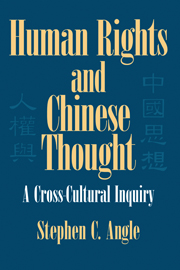Book contents
- Frontmatter
- Contents
- Preface and Acknowledgments
- Chronology
- Chapter 1 Introduction
- Chapter 2 Languages, Concepts, and Pluralism
- Chapter 3 The Consequences of Pluralism
- Chapter 4 The Shift toward Legitimate Desires in Neo-Confucianism
- Chapter 5 Nineteenth-Century Origins
- Chapter 6 Dynamism in the Early Twentieth Century
- Chapter 7 Change, Continuity, and Convergence prior to 1949
- Chapter 8 Engagement despite Distinctiveness
- Chapter 9 Conclusions
- Bibliography
- Glossary and Index
Chapter 9 - Conclusions
Published online by Cambridge University Press: 14 August 2009
- Frontmatter
- Contents
- Preface and Acknowledgments
- Chronology
- Chapter 1 Introduction
- Chapter 2 Languages, Concepts, and Pluralism
- Chapter 3 The Consequences of Pluralism
- Chapter 4 The Shift toward Legitimate Desires in Neo-Confucianism
- Chapter 5 Nineteenth-Century Origins
- Chapter 6 Dynamism in the Early Twentieth Century
- Chapter 7 Change, Continuity, and Convergence prior to 1949
- Chapter 8 Engagement despite Distinctiveness
- Chapter 9 Conclusions
- Bibliography
- Glossary and Index
Summary
THIS BOOK HAS REVOLVED around two questions: whether China can be said to have its own concept of rights, and whether countries with their own concepts of rights are immune from criticism phrased in terms of foreign rights concepts. Liu Huaqiu answers both of these questions in the affirmative. My own answers should now be clear. First, there have been both continuities and changes in the ways that rights have been conceptualized over the course of China's rich and distinctive rights discourse. These concepts are certainly China's “own”: The contexts within which they have emerged and been contested are central episodes in China's cultural and political history, and they have always drawn importantly on preexisting concepts and concerns – even when they have criticized some of the commitments central to those existing values. Second, we have seen that the only way a community can unilaterally declare its values and practices immune to the scrutiny of others is through “parochialism,” which also cuts off that community from making legitimate demands on others. As I will explain later, the activities of China's government, to say nothing of other Chinese actors, make it clear that they do not think of their values as parochial. This means that China cannot be immune from criticism, though it is no guarantee that any accommodation, much less constructive engagement, will be forthcoming between the Chinese and other communities.
- Type
- Chapter
- Information
- Human Rights in Chinese ThoughtA Cross-Cultural Inquiry, pp. 250 - 258Publisher: Cambridge University PressPrint publication year: 2002



